现在进行时语法详解及习题答案
小学英语语法之现在进行时[详解、练习、答案]
![小学英语语法之现在进行时[详解、练习、答案]](https://img.taocdn.com/s3/m/b297f846a55177232f60ddccda38376baf1fe0bd.png)
小学英语语法之现在进行时[详解、练习、答案]一、概念现在进行时表示说话时正在进行或发生的动作,也可表示当前一段时间内的活动或现阶段正在进行的动作.结构:助动词be ( am / is / are ) +现在分词.二、现在分词的构成:1.大多数动词后可在动词后直接加-ing.Eg: carry-carrying,catch-catching,drink-drinking。
enjoy-enjoying hurry-hurrying。
do-doing。
read-reading。
think-thinking2.如果动词以-e结尾,则去掉-e,再加-ing。
ing。
have-having。
make-making,ride-riding,write-writing,take-taking,use-using.3.如果动词只有一个元音字母,而其后跟有一个辅音字母时,将此辅音字母双写,再加-ing 如:hit-hitting,let-letting。
put-putting,run-running,sit-sitting.4.如果动词有两个音节,且重音在第二个音节上,则末尾的辅音字母须双写,再加-ing。
如: for’etting,pre’fer-preferring,up’set-upsetting.试比较’XXX。
’differ/differing,’profit/profiting,这些词的重音在第一个音节上,因此其末尾的辅音字母不双写.5.以-ic末端的动词,应先把-ic变成-ick,再加-ing,eg: panic/panicking,ic/icking,但XXX。
die/dying,tie/tying是非凡变革要记着.三、句型结构:1.目前举行时的一定方式、否认方式、疑问方式及其回覆,一切变革都体目前助动词be ( is / am/ are )上.1)目前举行时的一定方式:主语+be(am/ is/are)+doing+其他身分I am singing。
现在进行时表示将来的用法讲解及练习题

现在进行时表示将来的用法讲解及练习题现在进行时表示将来现在进行时表示将来,主要用于表示按计划或安排要发生的动作。
常有“意图”“安排”或“打算”的含义。
这种现在进行时比较生动,给人一种期待感。
它常表最近或较近的将来,所用动词多是转移动词。
表将来的现在进行时除用于转移动词外,亦可用于某些非转移动词。
能这样用的动词常用的有:arrive, come, do, get, go, have, leave, meet, play, return, see, spend, start, stay, wear, work 等。
如:I’m leaving tomorrow. 我明天走。
They’re getting married next month. 他们下个月结婚。
Are you meeting Bill this evening? 你今晚将和比尔见面吗?1) come, go, stay, arrive, leave 等词的现在进行时经常用来表示将来确切的计划。
2) 表示交通方式、行程安排的动词,例如 fly,walk, ride, drive, take(a bus, a taxi)等的现在进行时也经常用于表示将来。
如:但偶尔也表示较远的将来。
如:When I grow up, I’m joining the army. 我长大了要参军。
3)表将来的现在进行时有时含有“决心”的意思,多用在否定结构中。
如:I’m not going. 我不走了。
I’m not waiting any longer. 我不再等了。
有时也用在肯定结构中。
如:I’m b acking out. 我要打退堂鼓了。
4)用这种现在进行时与对方讲话时可变成命令,不过语气比较温和。
如:You are staying. 你留下吧。
Don’t forget: you are taking part too. 不要忘记:你也要参加。
5)现在进行时也可在时间、条件或原因状语从句中表示将来。
小升初语法专题讲练第21讲:现在进行时
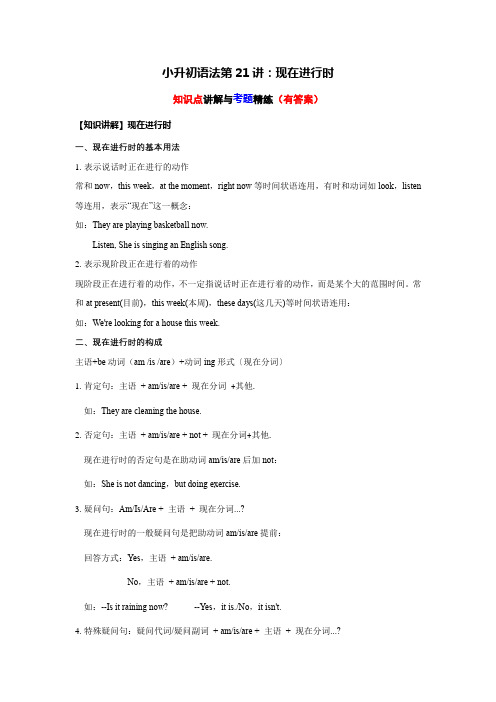
小升初语法第21讲:现在进行时知识点讲解与考题精练(有答案)【知识讲解】现在进行时一、现在进行时的基本用法1.表示说话时正在进行的动作常和now,this week,at the moment,right now等时间状语连用,有时和动词如look,listen 等连用,表示“现在”这一概念:如:They are playing basketball now.Listen, She is singing an English song.2.表示现阶段正在进行着的动作现阶段正在进行着的动作,不一定指说话时正在进行着的动作,而是某个大的范围时间。
常和at present(目前),this week(本周),these days(这几天)等时间状语连用:如:We're looking for a house this week.二、现在进行时的构成主语+be动词(am /is /are)+动词ing形式〔现在分词〕1.肯定句:主语+ am/is/are + 现在分词+其他.如:They are cleaning the house.2.否定句:主语+ am/is/are + not + 现在分词+其他.现在进行时的否定句是在助动词am/is/are后加not:如:She is not dancing,but doing exercise.3.疑问句:Am/Is/Are + 主语+ 现在分词...?现在进行时的一般疑问句是把助动词am/is/are提前:回答方式:Yes,主语+ am/is/are.No,主语+ am/is/are + not.如:--Is it raining now?--Yes,it is./No,it isn't.4.特殊疑问句:疑问代词/疑问副词+ am/is/are + 主语+ 现在分词...?如:--Who are you waiting for? --I'm not waiting for anybody.【考题精练】一、用所给的动词的正确形式填空。
(英语)英语现在进行时题20套(带答案)及解析
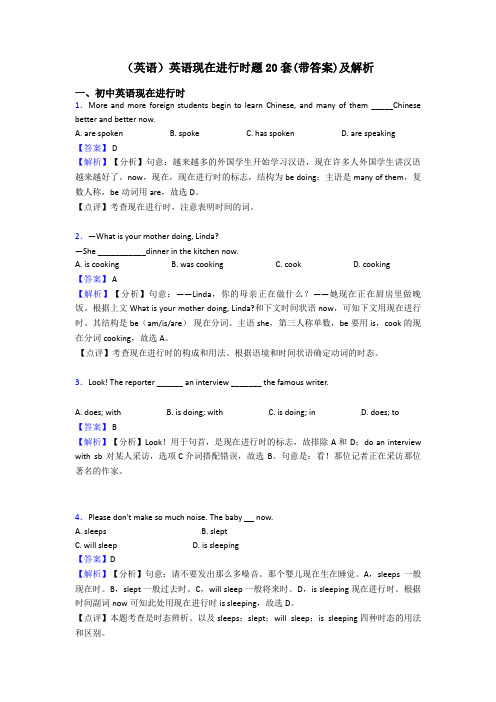
(英语)英语现在进行时题20套(带答案)及解析一、初中英语现在进行时1.More and more foreign students begin to learn Chinese, and many of them _____Chinese better and better now.A. are spokenB. spokeC. has spokenD. are speaking【答案】 D【解析】【分析】句意:越来越多的外国学生开始学习汉语,现在许多人外国学生讲汉语越来越好了。
now,现在,现在进行时的标志,结构为be doing;主语是many of them,复数人称,be动词用are,故选D。
【点评】考查现在进行时,注意表明时间的词。
2.—What is your mother doing, Linda?—She ___________dinner in the kitchen now.A. is cookingB. was cookingC. cookD. cooking【答案】 A【解析】【分析】句意:——Linda,你的母亲正在做什么?——她现在正在厨房里做晚饭。
根据上文What is your mother doing, Linda?和下文时间状语now,可知下文用现在进行时。
其结构是be(am/is/are)现在分词。
主语she,第三人称单数,be要用is,cook的现在分词cooking,故选A。
【点评】考查现在进行时的构成和用法。
根据语境和时间状语确定动词的时态。
3.Look! The reporter ______ an interview _______ the famous writer.A. does; withB. is doing; withC. is doing; inD. does; to【答案】 B【解析】【分析】Look!用于句首,是现在进行时的标志,故排除 A和 D;do an interview with sb 对某人采访,选项C介词搭配错误,故选B。
(完整版)现在进行时练习及答案
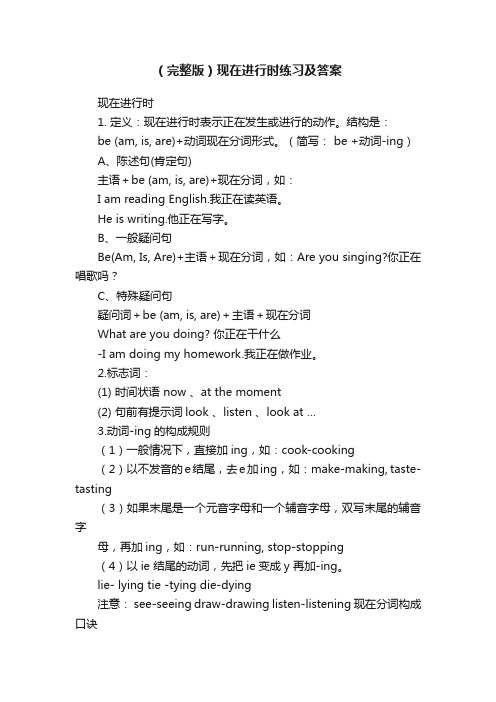
(完整版)现在进行时练习及答案现在进行时1. 定义:现在进行时表示正在发生或进行的动作。
结构是:be (am, is, are)+动词现在分词形式。
(简写: be +动词-ing)A、陈述句(肯定句)主语+be (am, is, are)+现在分词,如:I am reading English.我正在读英语。
He is writing.他正在写字。
B、一般疑问句Be(Am, Is, Are)+主语+现在分词,如:Are you singing?你正在唱歌吗?C、特殊疑问句疑问词+be (am, is, are)+主语+现在分词What are you doing? 你正在干什么-I am doing my homework.我正在做作业。
2.标志词:(1) 时间状语 now 、at the moment(2) 句前有提示词look 、listen 、look at …3.动词-ing的构成规则(1)一般情况下,直接加ing,如:cook-cooking(2)以不发音的e结尾,去e加ing,如:make-making, taste-tasting(3)如果末尾是一个元音字母和一个辅音字母,双写末尾的辅音字母,再加ing,如:run-running, stop-stopping(4)以ie 结尾的动词,先把ie变成y 再加-ing。
lie- lying tie -tying die-dying注意: see-seeing draw-drawing listen-listening 现在分词构成口诀现在分词很好记,动词后缀-ing。
直接加、去e加、双写加。
还有一点要注意ie要用y来替。
现在进行时用法口诀:主语在前be在后,现在分词跟着走,其他成分不可丢。
变一般很简单,把be 提到句子前,否定句也不难,be后要把not 添。
还有一点要注意,动作提问doing替。
现在进行时态练习题一、将下列动词变成ing形式help_______ come_______ swim_______ eat _______ give_______ find _______ sit _______ write_______ tie_______make _______ play_______ clean _______ catch_______ walk_______ ride _______ run_______draw_______ listen_______ begin _______ dance_______二.用所给词的适当形式填空。
现在进行时专项训练题及答案和解析

现在进行时专项训练题及答案和解析现在进行时是英语中的一种时态,用于表示正在进行或发生的动作。
在掌握和运用现在进行时时,我们需要了解其基本的构成方式和用法。
本文将为您提供现在进行时的专项训练题,同时包含答案和解析,帮助您巩固这一时态的学习。
一、现在进行时的构成方式现在进行时的构成方式是:•肯定句:主语 + be动词 + 现在分词(动词+ing)•否定句:主语 + be动词 + not + 现在分词•一般疑问句:Be动词 + 主语 + 现在分词?•特殊疑问句:疑问词 + Be动词 + 主语 + 现在分词?二、现在进行时的用法现在进行时主要用于表示以下几种情况:1.表示现在正在进行的动作:I am reading a book.(我正在看书。
)2.表示现阶段暂时的动作,可能不一定正在进行:He is studyingEnglish.(他正在学英语。
)3.表示计划或安排的将来动作:They are meeting at 5 o’clocktomorrow.(他们明天5点钟要开会。
)4.表示现阶段变化的动作:The weather is getting colder.(天气正在变冷。
)三、练习题1.They __________ TV at the moment. (watch)A. is watchingB. are watchingC. am watchingD. be watching2.What __________ right now? (you/do)A. are you doB. are you doingC. do you doD. do you doing3.Mary __________ at the library this afternoon. (study)A. is studyingB. are studyingC. am studyingD. be studying4.Look! The children __________ basketball in the park. (play)A. is playingB. are playingC. am playingD. be playing5.Why __________ so fast? (he/run)A. is he runB. are he runningC. does he runD. is he running四、答案和解析1.正确答案:B. are watching解析:根据题干中的。
现在进行时详解+例句

C.are callingD.call
【答案】C
【解析】
C考察动词时态。句意:自从那支乐队宣布了要发行新的专辑的消息,电话铃声就不停地响。很多粉丝一直都打电话询问具体的发行时间。根据句中的hasn’t stopped ringing可知询问具体的时间内这件事情现阶段正在发生,应该使用现在进行时。故C正确。
12.They won’t buy any new clothes because they ________ money to buy a new car.
A.saveB.were savingC.have savedD.are saving
【答案】D
【解析】
用现在进行时表示现在正在进行的动作。
13.You have no chance of getting the position. I'm afraid you ________ your time if you applyfor it.
考点:考查动词时态的用法。
6.—My dear, you ______ things about. Look, what a mess in the room!
—Sorry, Mom.
A.have always thrownB.always throw
C.are always throwingD.always threw
A.would haveB.have had
C.have been havingD.am having
【答案】D
【解析】
【分析】【详解】
考查动词时态。句意:——你最近见过Tom吗?——没有,但这周日我将和他一起吃晚餐。A. would have过去将来时,表示在过去某个时间看来将要发生的动作或存在的状态;B. have had现在完成时,表示到现在为止已经完成了的动作或状态;C. have been having现在完成进行时,表示动作从某时开始一直延续到现在;D. am having现在进行时,可表示在最近或按计划要进行的动作.cameD.am coming
小学语法专题:现在进行时全练全析
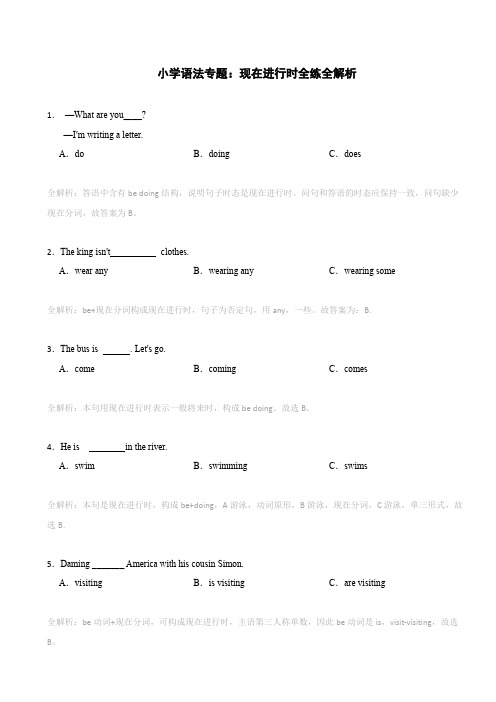
小学语法专题:现在进行时全练全解析1.—What are you____?—I′m writing a letter.A.do B.doing C.does全解析:答语中含有be doing结构,说明句子时态是现在进行时。
问句和答语的时态应保持一致,问句缺少现在分词,故答案为B。
2.The king isn't clothes.A.wear any B.wearing any C.wearing some全解析:be+现在分词构成现在进行时,句子为否定句,用any,一些。
故答案为:B.3.The bus is . Let's go.A.come B.coming C.comes全解析:本句用现在进行时表示一般将来时,构成be doing。
故选B。
4.He is in the river.A.swim B.swimming C.swims全解析:本句是现在进行时,构成be+doing,A游泳,动词原形,B游泳,现在分词,C游泳,单三形式,故选B.5.Daming _______ America with his cousin Simon.A.visiting B.is visiting C.are visiting全解析:be动词+现在分词,可构成现在进行时,主语第三人称单数,因此be动词是is,visit-visiting,故选6.What______________ you______________?A.are; do B.are; doing C.do; doing D.does; do全解析:故选B。
7.They ____ a lion dance now.A.are watching B.watched C.are going to watch全解析:根据now判断该句子是现在进行时,其构成是“主语+be+doing+其它”,主语是they第三人称复数,因此be动词用are,故选A。
2023年小学英语六年级小升初语法总复习(二)现在进行时 (译林版含答案)

2023年小升初语法总复习(二)现在进行时1.现在进行时的定义:表示现在正在进行或发生的动作,也可表示当前一段时间内的活动或现阶段正在进行的动作。
句中一般含有now, look, listen等词。
2.现在进行时的句型结构:(1)肯定句:主语+be动词+现在分词+其他.如:Tom is reading newspapers in the living room.汤姆正在客厅里看报纸。
(2)否定句:主语+be动词+not+现在分词+其他.如:Tom is not reading newspapers in the living room.汤姆没有在客厅里看报纸。
(3)一般疑问句:Be动词+主语+其他?(be动词提到句首)如:Is Tom reading newspapers in the living room?汤姆正在客厅里看报纸吗?(4)特殊疑问句:特殊疑问词+一般疑问句?【注意】当画线部分包含谓语动词时,用特殊疑问词代替画线部分放到句首,原画线处应加上doing。
如:Tom is reading newspapers in the living room.(对画线部分提问)What is Tom doing in the living room?3.动词现在分词的变化规则:(1)一般情况下,在词尾直接加-ing。
如:cook-cooking, look-looking, listen-listening。
(2)以不发音的e结尾的单词,去e加-ing。
如:make-making, taste-tasting。
(3)以重读闭音节结尾,且词尾只有一个辅音字母,则双写这个辅音字母,再加-ing。
如:run-running, stop-stopping, put-putting。
【即时演练】一、单项选择。
( )1.My brother his car in the garden now.A.washesB.is washingC.washed( )2.—Can Peter play games with us, Mrs Frank?—No. He a shower at this moment.A.is takingB.takesC.took( )3.Tom often swimming. But now he football.A.go; is playingB.goes; playsC.goes; is playing ( )4.—Alice, don’t play the guitar! I on the phone.—Oh, sorry, Mum.A.talkingB.talkC.am taking ( )5.Shh! My sister now.A.sleepsB.is sleepingC.sleep( )6.Listen! Mary an English song in the classroom.A.is singingB.singC.sings二、用所给单词的适当形式填空。
必备英语现在进行时难题及答案含答案解析
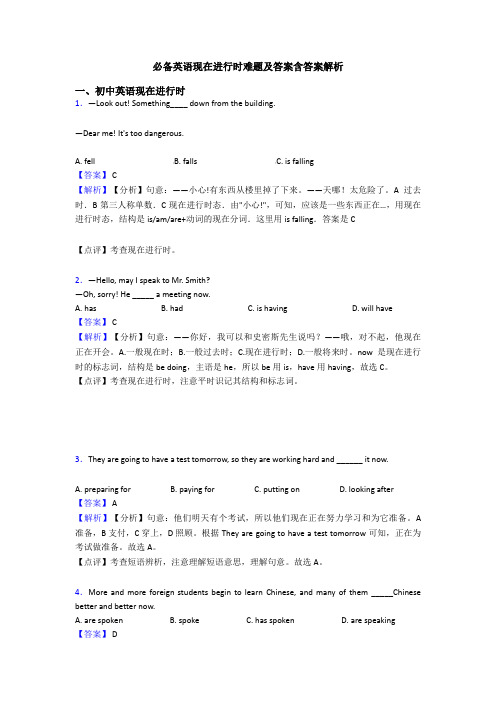
必备英语现在进行时难题及答案含答案解析一、初中英语现在进行时1.—Look out! Something____ down from the building.—Dear me! It's too dangerous.A. fellB. fallsC. is falling【答案】 C【解析】【分析】句意:——小心!有东西从楼里掉了下来。
——天哪!太危险了。
A过去时.B第三人称单数.C现在进行时态.由"小心!",可知,应该是一些东西正在…,用现在进行时态,结构是is/am/are+动词的现在分词.这里用is falling.答案是C【点评】考查现在进行时。
2.—Hello, may I speak to Mr. Smith?—Oh, sorry! He _____ a meeting now.A. hasB. hadC. is havingD. will have【答案】 C【解析】【分析】句意:——你好,我可以和史密斯先生说吗?——哦,对不起,他现在正在开会。
A.一般现在时;B.一般过去时;C.现在进行时;D.一般将来时。
now是现在进行时的标志词,结构是be doing,主语是he,所以be用is,have用having,故选C。
【点评】考查现在进行时,注意平时识记其结构和标志词。
3.They are going to have a test tomorrow, so they are working hard and ______ it now.A. preparing forB. paying forC. putting onD. looking after【答案】 A【解析】【分析】句意:他们明天有个考试,所以他们现在正在努力学习和为它准备。
A 准备,B支付,C穿上,D照顾。
根据 They are going to have a test tomorrow 可知,正在为考试做准备。
(完整版)英语现在进行时习题及答案(最新整理)
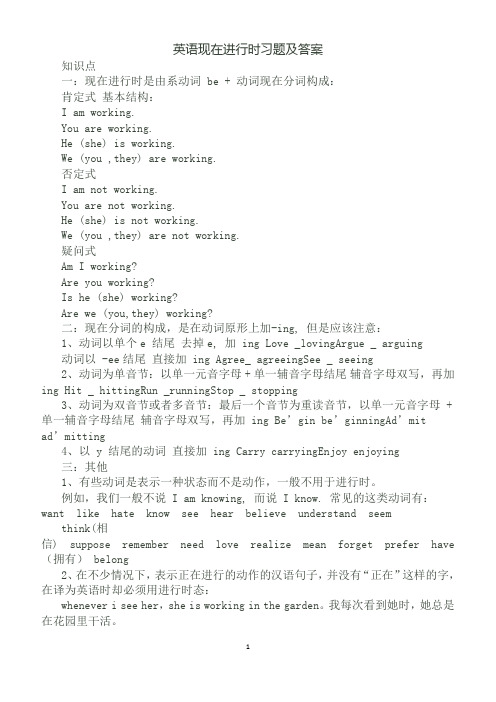
英语现在进行时习题及答案知识点一:现在进行时是由系动词 be + 动词现在分词构成:肯定式基本结构:I am working.You are working.He (she) is working.We (you ,they) are working.否定式I am not working.You are not working.He (she) is not working.We (you ,they) are not working.疑问式Am I working?Are you working?Is he (she) working?Are we (you,they) working?二:现在分词的构成,是在动词原形上加-ing, 但是应该注意:1、动词以单个e 结尾去掉e, 加 ing Love _lovingArgue _ arguing动词以 -ee结尾直接加 ing Agree_ agreeingSee _ seeing2、动词为单音节:以单一元音字母+ 单一辅音字母结尾辅音字母双写,再加ing Hit _ hittingRun _runningStop _ stopping3、动词为双音节或者多音节:最后一个音节为重读音节,以单一元音字母 + 单一辅音字母结尾辅音字母双写,再加 ing Be’gin be’ginningAd’mitad’mitting4、以 y 结尾的动词直接加 ing Carry carryingEnjoy enjoying三:其他1、有些动词是表示一种状态而不是动作,一般不用于进行时。
例如,我们一般不说 I am knowing, 而说 I know. 常见的这类动词有:want like hate know see hear believe understand seem think(相信) suppose remember need love realize mean forget prefer have (拥有) belong2、在不少情况下,表示正在进行的动作的汉语句子,并没有“正在”这样的字,在译为英语时却必须用进行时态:whenever i see her,she is working in the garden。
现在进行时详解+例句

A.would writeB.writesC.wroteD.is writing
【答案】D
【解析】
试题解析:本题考查时态,根据句意,选用现在进行时,表示说话时刻正在进行的动作。A would write过去将来时,必须和一般过去时结合使用,表示过去的将来;B writes一般现在时,表示经常、习惯的动作;客观真理;现在的事实或状态;代替一般将来时;C wrote一般过去时,表示过去的动作,与现在无关。
【答案】C
【解析】
试题分析:考查动词时态。句意:我恐怕不能帮你完成项目了,这几天我要做一个模型。没关系,我会自己完成。表示这几天一直要做的事情,用一般现在时表示将来,故选C项。
考点:考查动词时态
14.Hurry up! Mark and Carol ________ us.
A.expectB.are expecting
【解析】
考查动词的时态。根据问话人的问话内容可知,一些学生正在举行聚会,因此使用现在进行时。
答案:B
2.Hi, Mike. I’ve to borrow your car this afternoon mine _______ in the garage.
A.is repairingB.is being repaired
19.—Do you know when your mother ________ to pick you up?
—At 11:40 am.
C.has repairedD.has been repaired
【答案】B
【解析】
试题分析:考察时态语态。句义:今天下午我不得不借用你的汽车,因为我的汽车正在修理厂被修理。根据句义可知我的汽车正在被修理是正在发生的事情。根据句义说明B项使用现在进行时的被动语态正确。
现在进行时详解+例句
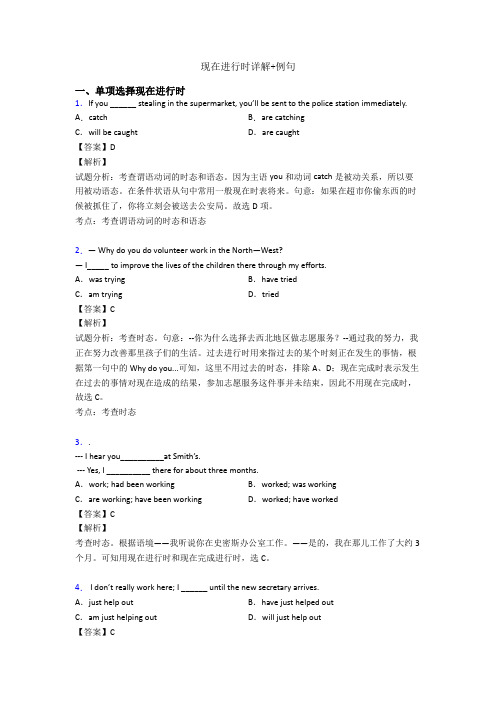
— Theyto another city.
A.had movedB.have movedC.movedD.are moving
【答案】D
【解析】
表示位移的词如fly,e, go,move等的进行时表将来。“他们要去另一座城市”所以选D.
【答案】C
【解析】
考查时态和主谓一致。the number of后接名词作主语时,谓语动词用单数;由后一分句中的“are shopping online”可知,前一分句也用现在进行时。
7.------ What’s wrong with you, Kate?
------ The shoes don’t fit me properly. They_____ my feet.
考点:考查时态
3..
--- I hear you__________at Smith’s.
--- Yes, I __________ there for about three months.
A.work; had been workingB.worked; was working
C.are working; have been workingD.worked; have worked
What will you be doing at five tomorrow afternoon?明天下午五点你们将要干什么?
还可以在口语中常用来表示按计划或安排即将要发生的动作。例如:When shall I be expecting you this evening?今晚我几点等你?
考点:动词时态
19.—Have you received a reply to your job application?
小学英语语法专项《现在进行时》练习附解析答案精选全文完整版
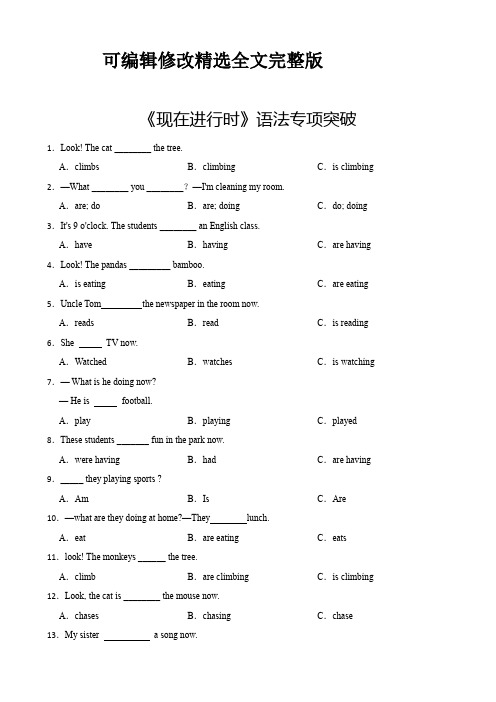
可编辑修改精选全文完整版《现在进行时》语法专项突破1.Look! The cat ________ the tree.A.climbs B.climbing C.is climbing 2.—What ________ you ________?—I'm cleaning my room.A.are; do B.are; doing C.do; doing 3.It's 9 o'clock. The students ________ an English class.A.have B.having C.are having 4.Look! The pandas _________ bamboo.A.is eating B.eating C.are eating 5.Uncle Tom the newspaper in the room now.A.reads B.read C.is reading 6.She TV now.A.Watched B.watches C.is watching 7.— What is he doing now?— He is football.A.play B.playing C.played 8.These students _______ fun in the park now.A.were having B.had C.are having 9._____ they playing sports ?A.Am B.Is C.Are 10.—what are they doing at home?—They lunch.A.eat B.are eating C.eats 11.look! The monkeys ______ the tree.A.climb B.are climbing C.is climbing 12.Look, the cat is ________ the mouse now.A.chases B.chasing C.chase 13.My sister a song now.A.is singing B.is sing C.sing 14.We _______ breakfast at a restaurant now.A.eat B.ate C.are eating 15.—What are Tim and Jim doing?— __________eating fruit.A.They B.They're C.There are 16.He is ______ a black shirt.A.wearing B.wear C.wears 17.Anna __________ on a picnic with her father now.A.go B.is going C.goes 18.The birds ________ watching us.A.is B.am C.are 19.—What's _________sister doing?— _________running.A.you, she's B.your, she's C.your, she 20.—What are you doing?— We're ___________the windows.A.clean B.cleaning C.cleans 21.Nancy a crown for her cousin now.A.making B.is make C.is making 22.—What are you doing?—I a letter.A.writing B.is writing C.am writing 23.I am ________on my winter hat.A.put B.putting C.puts 24.— you ?— Yes, I am.A.Are; writing B.Can; write C.Are; write 25.Helen _______ listening to music in the bedroom.A.is B.does C.hasA.puts B.putting C.put 27.Some teachers ____ basketball on the playground.A.play B.are playing C.is playing 28.Is he ______ water?A.drinking B.drink C.drank 29.The boy ______ now.A.run B.runs C.is running D.running 30.—What are you doing, Lily?—A.I'm cooking.B.I like cooking.C.I always cook for Tom.31.—What _________ you __________?— I'm playing football.A.are, do B.are, doing C.do, do 32.What ______John ______?A.is; doing B.are; doing C.are; does 33.Are you ______angry?A.feels B.feel C.feeling 34.—What is she doing?—She is ________.A.cooks B.cook C.cooking 35.—______is Ben doing now?—He is talking to Mr. Green in the classroom.A.Where B.Why C.What36.My sisters are _____ butterflies.A.catch B.catching C.catches 37.Are you _____ kung fu?A.does B.do C.doing 38.—What____the little cat ____?A.is; doing B.does; do C.is; do39.—Is the letter to Grandma ready?—Not yet. Tom _____it.A.wrote B.is writing C.writes D.will write 40.It is ____ now. Don't get out, please.A.rains B.to rain C.raining D.rained 41.Look! The bird______ on his hand.A.dance B.is dancing C.dances42.Our country is ________. We love it very much.A.change B.changes C.changing43.—________ the boys flying kites?—Yes, they________.A.Do; are B.Are; do C.Are; are 44.What are you _____?A.say B.saying C./45.He is _______a boat.A.playing B.rowing C.row46.It's 10 o'clock. Ben _______ TV in the bedroom.A.is watching B.watch C.watches D.are watching 47.He's ______.A.sleeping B.sleep C.sleeps48.He's _______noodles.A.makes B.make C.making 49.Some people are________ pictures.A.taking B.take C.takes50.—What are you doing?—I'm ________ a postcard.A.sending B.send C.sends答案解析部分1.C看,那只猫……爬树。
现在进行时讲解及练习(含答案)
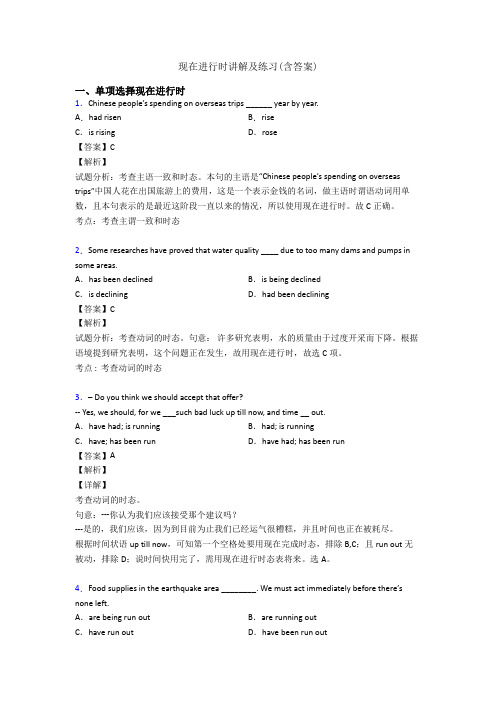
C.have run outD.have been run out
【答案】B
【解析】
试题分析:考查时态和语态。句意:地震灾区的食物供应快耗尽了。在用完之前,我们必须立即采取措施。根据第二句可知,食物还没有全部耗尽,根据句意可知,应该用现在进行时,排除C、D;run out是不及物动词短语,不能直接用于被动语态,后接宾语时,需要与介词of连用,排除A,故选B。
—Sorry, Mom.
A.have always thrownB.always throw
C.are always throwingD.always threw
【答案】C
【解析】
试题分析:考查时态。本题考查进行时的一个特殊用法,进行时与always连用,表示一种感情色彩,有批评的,也有表扬的。根据句意说明本句表示的是批评的语气。句意:——亲爱的,你总是到处乱扔东西,看你的房间真乱啊!——对不起,妈妈。故C正确。
A.have keptB.will have kept
C.am keepingD.keep
【答案】C
【解析】
试题分析:考查动词时态。句意:我申请了几家公司,其中一家答应给我一份工作,但我想等另外几家公司有了回音再作决定。(字面意思:……但是直到我收到其它公司信息我才公布我的选择)。这里用现在进行时表示将来。
【答案】D
【解析】
试题分析:考查谓语动词的时态和语态。因为主语you和动词catch是被动关系,所以要用被动语态。在条件状语从句中常用一般现在时表将来。句意:如果在超市你偷东西的时候被抓住了,你将立刻会被送去公安局。故选D项。
考点:考查谓语动词的时态和语态
Unit 5 Fantastic friends--单元重点语法:现在进行时+练习
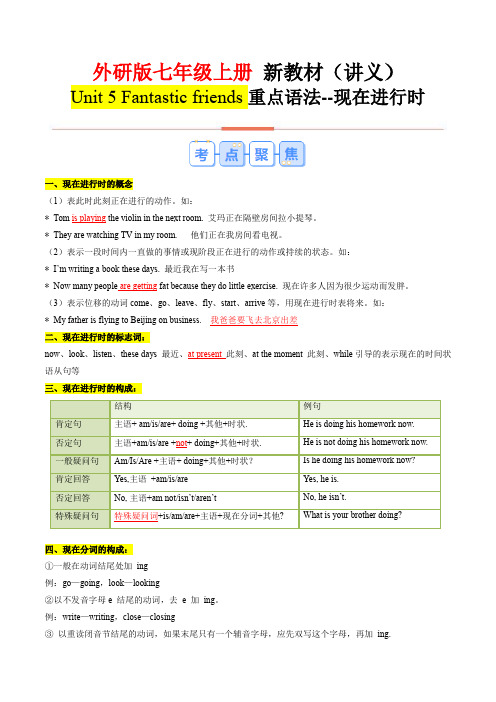
外研版七年级上册新教材(讲义)Unit 5 Fantastic friends重点语法--现在进行时一、现在进行时的概念(1)表此时此刻正在进行的动作。
如:* Tom is playing the violin in the next room. 艾玛正在隔壁房间拉小提琴。
* They are watching TV in my room. 他们正在我房间看电视。
(2)表示一段时间内一直做的事情或现阶段正在进行的动作或持续的状态。
如:* I’m writing a book these days. 最近我在写一本书* Now many people are getting fat because they do little exercise. 现在许多人因为很少运动而发胖。
(3)表示位移的动词come、go、leave、fly、start、arrive等,用现在进行时表将来。
如:* My father is flying to Beijing on business. 我爸爸要飞去北京出差二、现在进行时的标志词:now、look、listen、these days 最近、at present 此刻、at the moment 此刻、while引导的表示现在的时间状语从句等三、现在进行时的构成:四、现在分词的构成:①一般在动词结尾处加ing例:go—going,look—looking②以不发音字母e 结尾的动词,去 e 加ing。
例:write—writing,close—closing③以重读闭音节结尾的动词,如果末尾只有一个辅音字母,应先双写这个字母,再加ing.例:get—getting,run—running,(swim, run, put, get, sit, begin)五、注意:①有些动词一般不用于现在进行时,如see, like ,love, want, know 等,而用一般现在时。
小学英语语法现在进行时练习含详细答案

小学英语语法现在进行时练习含详细答案提示1.现在进行时表示动作正在进行,动词构成为be(am/is/are)+ V-ing。
2、动词的现在分词变化规则:(1)一般情况下,直接在动词词尾加-ing。
(2)以辅音字母加e结尾的动词,需去掉e,再加-ing。
(3)以重读闭音节结尾、末尾只有一个辅音字母的动词,要双写这个辅音字母,再加-ing(4)以ie结尾的重读开音节的词,改ie为y ,再加-ing。
1、用括号内动词的适当形式填空1What_____you_____(do)now?_____(play) video games.2. Listen! Miss Lynn______(sing)an English song.3.Mike can______(ride) a bike now.4.My parents______(get) rcady for my birthday party these days.5. Look at the picture. The children_______(fly) kites in the park.6.I am thirsty.I______(want) to drink some water now.2、选择正确的答并把编号填入号内。
( )7.Look,John and Mary______together.A. dancingB.are dancingC. dance( )8.Listen, who______ in the next room?A. SingsB.singC.is singing( )9.-Where is Mike?He____ his homework in his room.A.is doingB. doesC. doesn't do( )10.Look,she can____a rabbit nowA. drawB. drawsC.drawing( )11.Oh,you are late. Your boss_______for you in the office.A. WaitsB.waitC.is waiting( )12._______you_______anything strange in the room?A.Are,hearingB.Do,hearC.Arc,hear( )13. Tony________ hard these days.A.studyB.studyingC.is studyingII.根据要求改写句子14. Nine little Indians are dancing hand in hand.(改为否定句)__________________________________________15.Jane is playing games with James.(改为一般疑问句)_________________________________________16.Jenny has an English lesson every day.(用now 替换every day改写)_________________________________________17.Mum is making lunch for us in the kitchen.(对画线部分提问)_________________________________________18. The children are having a picnic in the park.(对画线部分提问)_________________________________________现在进行时练习答案1.are,doing,am playing(现在进行时表示动作正在进行,句子中有now 时,就要用现在进行时动词构成为be+V-ing。
- 1、下载文档前请自行甄别文档内容的完整性,平台不提供额外的编辑、内容补充、找答案等附加服务。
- 2、"仅部分预览"的文档,不可在线预览部分如存在完整性等问题,可反馈申请退款(可完整预览的文档不适用该条件!)。
- 3、如文档侵犯您的权益,请联系客服反馈,我们会尽快为您处理(人工客服工作时间:9:00-18:30)。
现在进行时基本用法一.现在进行时的肯定肯定句、否定句、疑问句形式:现在进行时:表示现在正在进行的动作,由“be动词+ 动词的现在分词”构成。
现在进行时的肯定句句型(1)第一人称:主语+ am + 现在分词+ ……eg. I am watching TV. 我现在看电视。
(2)第三人称单数:主语+ is + 现在分词+ ……eg. She is washing the dishes. 她正在洗澡。
(3)第二人称及复数人称:主语+ are + 现在分词+ ……eg. They are playing games.现在进行时的否定句句型主语+ 相应be动词+ not + 现在分词+ …eg. He isn't watching TV. 他没在看电视。
I am not cooking. 我没有在做饭。
We aren't haveing English calss. 我们没在上英语课。
现在进行时的一般疑问句句型相应be动词+ 主语+ 现在分词+ ……?eg. Are you dancing? 他们正在跳舞吗?Is he drawing a picture? 他正在画一张画吗?Are you talking with your friend? 你正和你的朋友谈话吗?现在进行一般疑问句的答语(1)肯定回答:Yes, 主语+ 相应be动词。
(2)否定回答:No, 主语+ 相应be动词+ not。
eg. Are you listening to the music? Yes, I am. / No, I am not. 你正在听音乐吗是的,我正在听不,我没在听。
Is Aunt Wang knitting a sweater? No, she isn't. 王阿姨正织毛衣吗不,她没有。
现在进行时的特殊疑问句句型特殊疑问词+ 相应be动词+ 主语+ 现在分词+ ……?eg. What are you doing? 你正在干什么?Who is singing a song? 谁在唱歌呢?Why are they cleaning their room? 他们为什么在打扫房间?现在进行时特殊疑问句的答语回答特殊疑问时,根据不同的疑问词的情况来决定回答方式。
回答what提问时,答语是现在进行时的肯定形式;回答who提问时,只需说明主语是谁,再加相应的be动词即可。
eg. What is he doing? He is writing a letter. 他正在干什么?他正在写信。
Who is swimming in the lake? Jim is. 谁正在湖里游泳?吉姆正在游泳。
二.现在进行时的用法时间状语:now, these days, recently,at the present现在,at the moment现在,today今天,this week这个星期,this year今年(1)现在进行时可以表示说话时正在发生的动作,常和now, right now, at this moment 等时间状语及动词look 或listen 等连用,这是现在进行时的“暂时性”特征如:They are playing basketball now.现在他们正在打篮球。
Listen!She is singing an English song.听,她正在唱英语歌。
Look! They are reading over there under the tree.看他们在那边的树底下看书。
(2)现在进行时可以表示目前一段时间内一直发生的动作,但是说话时不一定在发生,常和these days, this week, at present 等时间状语连用,这是现在进行时的“阶段性”特征。
如:We are making model planes these days.这些天我们在做飞机模型。
We are preparing for the concert these days.这几天我们一直在为音乐会做准备。
(3)现在进行时常表示一种目前的暂时情况,通常暗示动作还没有结束。
She is writing a book, but I don't know if she has finished it.她正在写一本书,但我不知道她是否写完了。
(4)描述图片中的人物的动作,也为了表达更生动。
此时也常用现在进行时。
如:Look at the picture. The children are flying kites in the park.看这幅图那些孩子正在公园放风筝(5)在口语中表示主语计划将要作的动作。
这类情况常与come来,go去,leave离开,depart离开,arrive到达,stay逗留,start开始drive, move, , take, get, stay, fly, finish, return, go off, see off, die, take off等动词连用。
所用的动词必须是动作而不是状态,主语必须是人。
They are leaving for New York tomorrow. 明天他们将要动身前往纽约。
Is your brother departing soon? 你的兄弟很快就要启程吗?(6)动词现在进行时常与always搭配使用,表示反复出现或习惯性的动作,隐含说话人的赞扬、喜好或厌恶的情绪。
这类情况常与always总是,usually通常,continually不断的,constantly经常的,forever永远、老是等副词连用。
The PLA Chinese People's Liberation Army are always / often helping the farmers get in crops in the harvest time.解放军战士常在收割时节帮助农民收割庄稼。
(表示赞叹)My wife is always / constantly / often ordering me to do this or that at home.我的妻子在家里总是吩咐我干这干那。
(表示厌恶)He's always quarrelling with others. 他老喜欢跟别人吵架。
She is constantly worrying about her son's health. 她不停地为她儿子的健康担心着。
The boy is forever asking questions. 那个男孩老是问问题。
(7)有的现在进行时句子和一般现在时同义。
用现在进行时表示问者的关切心情。
How are you feeling today? (How do you feel today?)你今天感觉如何?I am looking (look)forward to your next visit. 我盼望你下次再来。
Why are you looking(do you look)so sad? 为什么你看起来这么愁眉苦脸的样子呢?(8)有的动词用于现在进行时表示“逐渐”的含义。
此种用法除了偶尔和now连用外,一般不和其他时间副词连用的。
Our study is becoming more interesting. 我们的学习变得越来越有趣了。
The leaves are turning red. 树叶渐渐地变红了。
The war is ending. 战争接近尾声了。
Wait a moment; I am finishing my supper. 等一会儿,我的晚饭就要吃完了。
适合于此种用法的动词有:bet/grow/become/turn/run/go变成,begin开始,forget忘记,remember记得,die死,finish完成,find发现,rise增强等.(9)“be”动词的现在进行时。
“be”动词用于现在进行时表示说话者认为是短暂的、和平常不一样的、甚至是伪装的。
He is being foolish. 他在装傻。
He is being honest. 他表现得特别老实。
She is being rude. 她故意表现粗鲁。
I can't understand why he is being so selfish.我不明白此时他为何如此自私。
适合于此种用法的有:foolish愚蠢的,nice好的,kind好心的,careful细心的,patient耐心的,lazy懒惰的,silly傻的,rude粗鲁的,polite礼貌的,impolite无礼的等表示人的特性、性格的形容词。
(“be”动词用于现在进行时表示人的行为,纯粹表示心理或生理的状态而不带有行动时或主语不是人时,“be”动词不能用于现在进行时)如:I am happy.(表语是纯粹的心理状态,不可用am being)我很快乐。
He's tired.(表语是纯粹的生理状态,不可用is being)他很疲倦。
It's hot today.(主语不是人,不可用is being)今天很热。
常和现在进行时连用的时间状语三.并非英语中所有的动词都有进行时态。
1. 表示心理状态、情态的动词如love, hate, like, care, respect, please, prefer, understand, know, forget, remember, believe, want, mind, agree, wish, recognize, mean, need 等,它们只能用于一般时态。
如:We love our great motherland.我们热爱我们伟大的祖国。
2. 感官动词如see, hear, notice, feel, smell, sound, taste, look 等一般不用进行时态。
它们通常用一般时态,表示主语的一种无意识的行为,指主语所具有的能力。
如果用进行时态,则表示主语的一种有意识的行为。
试比较:I (can )smell something burning.我闻到有东西烧焦了。
I am smelling the flower.我在闻这朵花。
注意:如果感官动词的主语是表示物的词语,则只能用于一般时态,表示主语所具有的特点或特征。
如:The flower smells sweet.这花闻起来很香。
3. 表示存在及状态的延续性动词。
如lie, stand, exist, be, remain 等一般不用于进行时态。
如:How do things stand at the moment目前事情的状况如何?Does life exist on Mars?火星上有生命吗?但当这些动词表示暂时性的动作或表示瞬间动作或延续性动作的意义时,可用于进行时。
